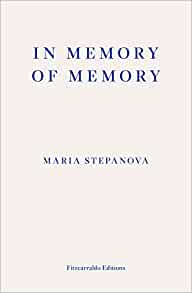In Memory of Memory
Maria Stepanova
(Fitzcarraldo Editions 2021); pbk £14.99
This book about my family is not about my family at all, but something quite different: the way memory works, and what memory wants from me.
Maria Stepanova has been a popular and prolific poet, essayist and journalist in Russia for many years, but 2021 was the year her work was brought to the English-speaking world. In Memory of Memory is one of three books published in translation this year; a poetry collection War of the Beasts and the Animals (Bloodaxe) and The Voice Over, a collection of poems and essays (Columbia University Press).
At 500 pages, and without much in the way of conventional narrative thrust, this is a commitment of a read. The reader is invited eavesdrop on a meandering and philosophical conversation on the past with writers, artists and scholars who are transfixed by its unknowable, shifting nature and its hold on the present. Stepanova is understandably haunted by her family’s past. Their survival – and therefore her existence – is in itself an unlikely series of coincidences owing to their position in the history of Russia. As she puts it with a poet’s eye for the weight of words,
… we have nothing to lay our foundations on – like most of the people who escaped from the black ink of the twentieth century, taking only what they could.
At the beginning of the century, Stepanova’s middle class Jewish family lived in an isolated town somewhere east of Moscow. Their stories, those of soldiers, doctors, housewives and factory owners, many of whom lost everything to anti-semitism and war thread throughout In Memory of Memory, with Stepanova compelled to uncover what she can but haunted by her inability to catch anything solid. She is keen to point out however that ‘[t]his book about my family is not about my family at all, but something quite different: the way memory works, and what memory wants from me.
This deeply personal quest becomes, after a while, one for all of us and leads to many more unanswerable questions concerning the legacy of war, persecution, family; the place of record keeping, family photographs, art and literature as means to locate ourselves within a larger story.
An especially moving motif begins when Stepanova finds a box of tiny china dolls in a Moscow flea market, each one missing at least one limb. Throughout the book these figures are referred back to as an allegory for the fragility of individual lives, both as they are lived and what remains of them after they are gone.
My china boy seemed to embody the way no story reaches us without having its heels chipped off or its face scratched away. And how lacunae and gaps are the constant companions of survival, its hidden engine, fuelling its acceleration.
But the doll is not just metaphor. In Stepanova’s associative patchworked narrative, the figurine weaves its own way through the 20th century; a pre-war German factory mass producing them for use as packaging material; their namesake, the tragic heroine of an American folktale about a woman who froze to death on the way to a ball.
And as with objects, so with ideas. Stepanova braids in many voices from art, literature and philosophy to comment on our collective and individual relationship to memory, from well-known greats such as Proust and Sebald to lesser-known creators and compilers such as the extraordinary narrative artist Charlotte Salomon, a German Jew who worked prolifically in the years preceding her capture by the Nazis.
And everywhere the story is broken, disrupted by the dead-ends of forgetting, either accidental or decidedly purposeful. In Memory of Memory is peppered with transcripts of the few family letters which survive. They ground the narrative, reminding us that this story began and is propelled by real, mundane living.
Ellie Julings


Leave a Reply